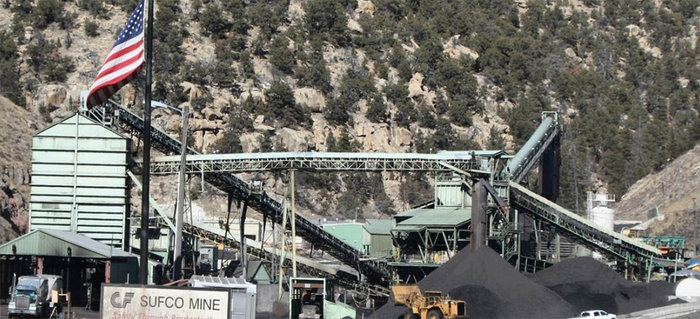A coalition of environmental groups is calling for a federal investigation into Utah’s commitment of $53 million to a proposal to develop a California port to export coal to Asia.
A coalition of environmental groups is calling for a federal investigation into Utah’s commitment of $53 million to a proposal to develop a California port to export coal to Asia.
At the end of its session in March, Utah legislators approved a fund-swapping plan that committed the money to help build the deep-water port in Oakland to facilitate selling Utah coal overseas. The plan would loan the money from Utah’s Permanent Community Impact Fund (CIF) to four coal-producing counties to invest in the proposed Oakland Bulk and Oversized Terminal at the site of the former Oakland Army Base.
Groups including the Center for Biological Diversity and the Sierra Club are questioning the legality and ethics of the plan in a 19-page letter to U.S. Attorney General Loretta Lynch and others.
The letter, which also was addressed to Gregory J. Gould, director of the Office of Natural Resources Revenue, and Mary Kendall, interim inspector general of the Department of the Interior, cites the group’s perceived view of Utah’s misuse of federal community development funds and the elaborate web of potential conflicts.
But the whole kerfuffle may be moot. The Oakland City Council voted overwhelmingly late last month to ban the storage and handling of coal within city limits, dealing a likely fatal blow to an effort to build what would be the largest coal export facility in California.
The city council voted unanimously, with one member not present, on two ordinances related to the project. The ban also applies to petroleum coke. Under city policy, the ban will not receive final approval unless it is passed on a second vote, to be held July 19. In view of the recent vote, that is widely expected to happen.
The vote came after four hours of sometimes raucous public testimony and more than a year after the issue first began roiling local politics.
Supporters of a ban cited studies showing pollution risks, including to industrial West Oakland, a part of the city that already suffers more than most places from severe rates of child asthma, cancer and other pollution-related diseases. They also said the ban would limit the burning of fossil fuels in Asia, the intended market for the coal.
Opponents said environmental concerns were overstated and that the terminal would bring much-needed jobs to a struggling, heavily African-American community. They said improving economic health would improve public health.
The council overwhelmingly rejected that argument.
“It’s a false choice,” said council member Abel Guillen. “It’s not jobs versus the environment. We can do both.”
Officials have privately said that they want to see the facility on the former Oakland Army Base rebuilt, just not for coal shipments, according to the Associated Press.
Keith Heaton, board chairman of CIF, from which the project’s financing was to come, defended the plan to move the money. He has said the funding plan is not unusual.
But the environmental groups asking for the investigation disagree.
“This appears to represent the worst kind of corporate cronyism that members of the Utah Legislature are usually so fond of rallying against,” Joshua Kanter, chairman of the Alliance for a Better Utah, said in a statement. “Diverting these funds is not only improper, but will leave these communities without the money they really need to help them retool their economic base as the coal industry continues its decline. There has been no showing that there is a shortage of available port capacity for Utah coal or that exporting Utah coal to Asia makes economic sense, either of which is easily addressed by the free market without this shell game and abuse of the public trust.”
Proponents of the deal have talked about their goal to provide a guaranteed market for coal mined in the state’s rural south, a region hit hard by the declining domestic coal market. The demands of the environmental coalition are a demonstration of how the investment has met opposition in Utah. Local newspapers have also editorialized against it.
But opposition in Oakland was far more intense. In 2014, the city passed a nonbinding resolution opposing the transportation of coal, petroleum coke and crude oil in the city. Last year, Mayor Libby Schaaf engaged in a public feud with the site developer Phillip Tagami, accusing him of misleading the public about his plans.
Hundreds of people attended the Oakland City Council meeting when the vote was taken. Opponents of the ban were particularly noisy, accusing the council of siding with environmentalists over jobs for its most impoverished residents.
On the other side, labor leaders, healthcare workers, activists from Utah and the Sierra Club and even several high school students spoke in support of the ban.
A lawyer for Tagami’s company, California Capital and Investment Group, said in a letter after the vote that the company would take the city to court if the council proceeded to approve the ban.
Back in Utah, Democratic gubernatorial candidate Michael Weinholtz, who will face Gov. Gary Herbert in the November general election has also weighed in on the controversy, call for an immediate freeze on the funds. Responding to the Oakland City Council’s vote, Weinholtz said, “I am calling on the Gov. Herbert and the Legislature to freeze the $53 million coal port appropriation defined in SB246," the first disbursement of which was scheduled to be made, July 1.
“This money should be frozen until the full impact of the Oakland City Council vote can be determined,” continued Weinholtz. “Better yet, this money should be put to better use preparing these rural Utah communities for the continued decline of the coal industry rather than bolstering a private enterprise.”








